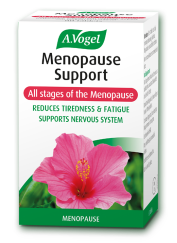An introduction to loss of libido and menopause
Loss of libido is a common complaint among menopausal women. Libido is the term used to describe sexual interest or desire. There are two main reasons for loss of libido during the menopause:
- Psychological - this is when a woman has no emotional interest in sex
- Physical – this is when the woman is suffering from vaginal dryness, for example. This often causes painful intercourse, and so loss of libido is an expected result.
Often this symptom is not seen as a problem until the woman is concerned or frustrated about it. Often loss of libido can cause problems in a relationship, which is when many menopausal women begin to look for a solution.
Why does menopause cause lack of libido?
There is a range of reasons for loss of libido, ranging from the side-effect of medicines to high levels of stress. However, during the menopause, hormonal changes are often the main contributor towards loss of libido.
Oestrogen is the main female hormone. It allows the walls of the vagina to be healthy and lubricated. When the levels of oestrogen decrease, the vagina walls can become dry and irritated. This can make sexual intercourse painful. However, lowered levels of oestrogen also result in hot flushes and night sweats, which can make a woman feel less attractive with consequent effects on libido.
Progesterone and testosterone also play an important role in libido levels. Testosterone is the main hormone for causing sexual desire. Progesterone stimulates the production of this hormone. However, during the menopause, levels of progesterone also reduce, resulting in loss of libido.
What home remedies are there for loss of libido?
Many women find that simple home remedies offer all they need to increase their libido:
- Regular aerobic exercise – this helps increase a woman’s stamina and strength. Often exercising regularly can also make you feel better about your image, boosting your libido
- Spend time with your partner – if you lose intimacy with your partner, your sexual desire will naturally reduce. It is important that you can communicate well with your partner to increase your emotional bond
- Stress less – while this is easier said than done, stressing has a negative impact on libido. If you feel that stress is at the root of the problem, tackling this will increase your libido levels
- Add to your diet – certain foods are thought to increase libido, including magnesium-containing foods, soy and protein.
Are there herbal remedies to help me?
Loss of libido can be complex to deal with because of the overlying psychological causes.
If your symptom is associated with other symptoms of the menopause such as tiredness or memory lapses, use a supplement containing isoflavones. Soya beans are rich in this substance and the best supplements are made from fermented soy. Isoflavones are known as phytoestrogens as they mimic the action of oestrogens normal produced by the body.
 "Helped to eliminate all the unpleasant moments of my menopause."
"Helped to eliminate all the unpleasant moments of my menopause." ![]()
Read more customer reviews
What about conventional medicine?
If you have tried home and herbal remedies, but feel little improvement in your libido, then it may be worth seeking medical advice for your symptom. Your doctor may be able to prescribe treatment to boost libido. Many of these will be hormone-based treatments such as HRT, as it is a hormone imbalance at the root of the problem.
If your loss of libido is a side-effect of some other medication you are taking, your doctor may be able to work with you to find an alternative. If you are worried about your condition, it is also important to seek medical advice.









